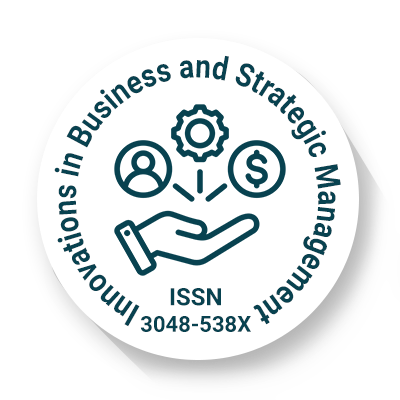
Innovations in Business and Strategic Management
OPEN ACCESS
ISSN: 3048-538X

OPEN ACCESS
ISSN: 3048-538X
Strategic planning is the cornerstone of any successful business or organization, driving decision-making and long-term growth. The methodical process of strategic planning enables businesses to establish their vision, establish reasonable objectives, and create effective plans for achieving those objectives. Companies that use strategic planning set themselves up for long-term success, resilience, and innovation in the fast-paced economic environment of today.
In essence, strategic planning involves a determination of the organization's state, the market forces, the opportunities, and specifying the objectives. Strategic planning entails conducting a thorough analysis of the internal and external business variables that drive company growth. Organizations can make sure that all efforts are directed toward their overall success once the objectives, resources, and market conditions have been established.
One of the primary benefits of strategic planning is its ability to provide clarity and direction. Businesses may find it difficult to respond to changing market conditions or allocate resources without proper planning. Businesses can respond to future difficulties, seize new opportunities, and adjust to changing customer demands with the help of a strong strategic framework. This forward-thinking approach minimizes ambiguity and maximizes decision-making across the board.
Strategic planning is a continuous process that changes in response to market conditions and company objectives rather than being a one-time occurrence. Organizations must periodically review their plans, track their success, and make necessary adjustments. Mission and vision statements, SWOT analyses, goal-setting, and execution roadmaps are some of the fundamental components of a successful strategic plan. When taken as a whole, these components provide a thorough development roadmap.
One of the most important aspects of strategic planning is the emphasis on resource optimisation. Businesses must use their technological, human, and financial resources as efficiently as possible while minimizing waste. A well-written strategy enables businesses to increase efficiency, simplify complexity, and prioritize tasks. Businesses can monitor their progress and make fact-based decisions to keep on course by establishing quantifiable goals and key performance indicators (KPIs).
Secondly, strategic planning creates collaboration and accountability. When workers understand the company's vision and objective, they are more inclined to help it succeed. Cross-functional collaboration and open communication ensure that every department is driven to innovation and continuous development while maintaining an emphasis on the overall company plan.
The external corporate environment is constantly changing, thus flexibility and adaptability are critical components of strategy formulation. Businesses must remain at the forefront of technological advancements, market trends, and rivalry. Organizations can predict disruptions and capitalize on emerging opportunities by conducting continual market research and scenario planning. This responsiveness is especially crucial in today's fast-paced digital economy, where industries are continuously changing due to new business strategies and consumer trends.
Effective strategic planning is also essential for risk management. Organizations can ward off threats and preserve business continuity by foreseeing possible hazards and developing backup strategies. Businesses with sound strategic planning are more likely to weather economic downturns, regulatory changes, or industry disruptions and continue to grow over the long run.
Corporate social responsibility (CSR) efforts are facilitated by strategic planning in addition to risk management. Organizations that include sustainability and ethical issues in their strategy plans not only benefit society but also acquire the trust of stakeholders. Environmental sustainability, ethical corporate practices, and charitable giving are all becoming increasingly essential components of modern business operations. Long-term success and enhanced reputation can be attained by organizations by connecting these values to long-term goals.
Strategic planning shapes a company’s future by setting clear goals, optimizing resources, and adapting to market shifts. Organizations that embrace it as an ongoing process gain a competitive edge, drive innovation and ensure long-term success. Innovations in Business and Strategic Management play a key role in advancing research on strategic frameworks, industry trends, and best practices, helping businesses navigate complexities and achieve sustainable growth.